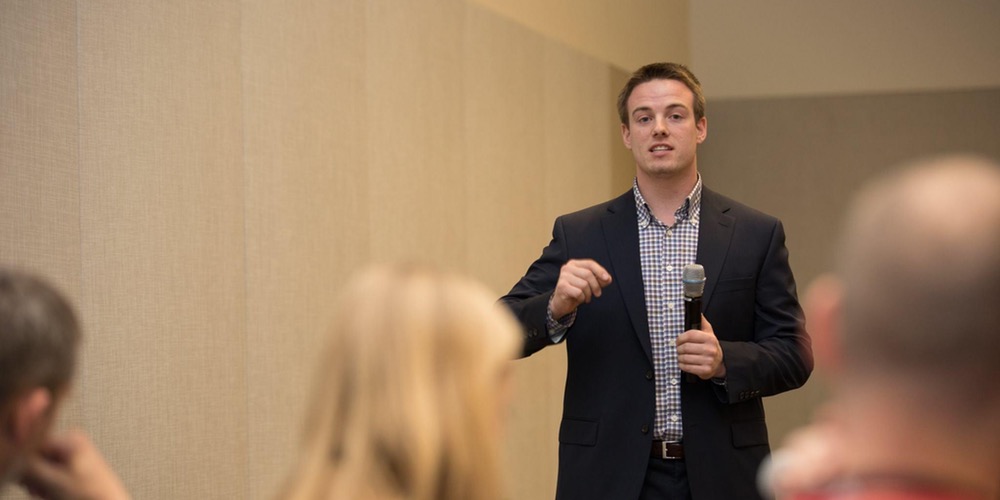
Get Paid to Share Your Expertise
Help shape the future of business through market research studies.
See Research StudiesI had the great privilege of serving again as a judge for the Entrepreneurs’ Organization’s Global Student Entrepreneur Awards (GSEA) US Finals.
The winner received $10,000 and round trip airfare to compete against more than 50 other country champions in the Global Finals in Frankfurt, Germany in April. I congratulated the winning team at the US Finals in Kansas City after their pitch, and then interviewed one of the co-founders. I wanted to learn about his motivations, the networks he developed, and how he and his partner overcame obstacles that are part of any entrepreneurial endeavor.
Matthew Rooda is a University of Iowa undergraduate student who will be graduating this spring, and the co-founder of SwineTech, a startup focused on saving piglets lives in farrowing facilities. He and his business partner, Abraham Espinosa, have already raised more than $1 million from 18 investors. Matthew competed last at last year’s US Finals in Miami, and came back this year to win the competition with a pitch that not only provided a stronger business plan, but also more clearly conveyed the personal reasons for launching his business. (The GSEA competition criteria heavily emphasizes the person as much as the business idea.)
-
Make it Personal
Matt was never really looking to become an entrepreneur, but rather stumbled upon it. In college, he studied genetics and biotechnology, with the goal of becoming an obstetrician. A medical school acceptance committee advised him that he needed to find a way to stand out from his fellow applicants by doing something different. Because farming had already been a big part of his life, working on his family farm with his father and grandfather, he obtained a management position on a farm, where he was responsible for helping thousands of sows give birth. Here he treated these animals with various types of medications and even sedatives, something no other premed student was doing. His previous experience on his family farm had shown him that piglets being accidentally crushed by their sows was a significant problem, and significantly limited productivity improvements. His dad encouraged him to launch a business to implement his ideas for solving this problem.
His inspiration in becoming an entrepreneur also came from his extended family, including his grandparents and an uncle. He was able to see first-hand how they led their companies and treated their employees. He also witnessed the results that came from their success, including their philanthropic endeavors. Rather than becoming a physician, Matt realized he could make a bigger impact as a successful entrepreneur.
-
Humbly Ask for Help
Key assistance came from his mentors at the University of Iowa, the Iowa Startup Accelerator, and the Entrepreneurial Development Center in Cedar Rapids. These organizations were instrumental in connecting them to each of the mentors that have contributed to their success so far. One individual in particular was David Oliver, a mentor for the University of Iowa’s Student Accelerator, who was blunt with them when no one else was and was a part of many “therapeutic meetings” with his business partner, Abraham. Adam Koppes, an investment manager for the Iowa Farm Bureau, gave them tough feedback on their pro forma financial statements from the very beginning, and helped prepare them for their Series A round. Other mentors and advisors provided help with product design, introductions to others in the pork industry, and feedback on how the business partners conducted customer meetings.
-
Build Trust through Dependability and Empathy
Trust depends on demonstrating reliability, openness/honest, competence, and compassion. Matt noted that many farmers to whom he sells have been taken advantage of in the past in their business dealings, and that that makes getting a sale difficult without having a farming background. Also, as the industry is very tight-knit, his reputation for “reliability and integrity quickly spread” from customers to prospects. His background and track record also made it easier for farmers to believe his message that “we are there for them and want to help them make more money and improve the way we raise pork. They know my intentions are to be successful in helping them and not just to make a quick buck.”
-
Expect Obstacles in Order to Overcome Them
Matt “truly believes that when you face obstacles your true innovation shines.” Initially, there weren’t any electrical outlets to plug in their monitor to work because they were all occupied by heat lamps. They turned this negative into a “revenue-driving positive” by running customers’ heat lamps through their monitor instead, which gave customers the added benefit of being able to regulate each pen’s temperature at a level never before achieved in the pork industry.
Any Last Words of Advice?
Matt closed our interview by recommending that other student-entrepreneurs “focus on building strong relationships with your professors at the beginning of each semester. You will most likely miss a lot of class and you need them to know that it’s because you are working your tail off and not just being lazy!”

 Aneil Mishra
Aneil Mishra